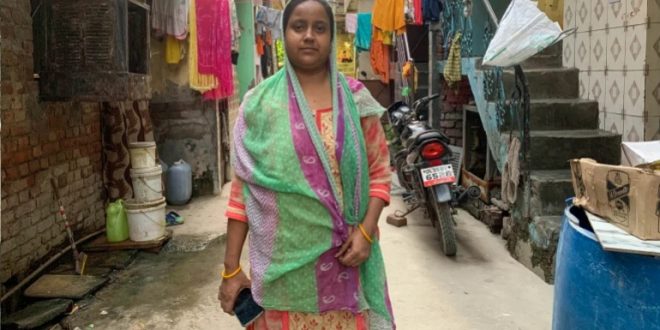08-09-2022
Bureau Report + Agencies
NEW DELHI: Munni Begum was 10 when her mother made her drop her last name. At that time, she did not understand why. She often accompanied her mother and grandmother as they juggled multiple cleaning, cooking and caregiving jobs in the Indian capital, New Delhi but it was only when Begum, now in her late 50s, started doing domestic work herself that she learned that all the women in her family had to pick up Hindu-sounding names at their workplaces in order to survive.
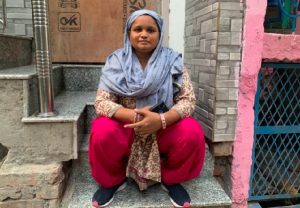 “They just won’t hire us,” she told media. “They hated us Muslims. Some of them said it to our face that we are bad people. So, Munni was a name that went well with both (Hindu and Muslim) communities.”
“They just won’t hire us,” she told media. “They hated us Muslims. Some of them said it to our face that we are bad people. So, Munni was a name that went well with both (Hindu and Muslim) communities.”
Begum recalls her widowed mother would go to work wearing a sari and bindi that are traditionally associated with the Hindu culture. “And my sister used to work even on Eid al-Fitr to avoid suspicion,” she said.
Having worked for more than 40 years as a domestic worker, Begum said she faced discrimination and insults at many Hindu and Jain households. She said she was turned away at many homes because of her Muslim identity.
“I had to raise my children on my own, my husband didn’t support me at all. It was so difficult,” she said.
The number of domestic workers in India where Muslims make about 15 percent of its 1.5 billion population is unknown.
The International Labor Organization, a United Nations agency, says while official statistics place the number at five million, there could be anywhere between 20 million to 80 million domestic workers in India.
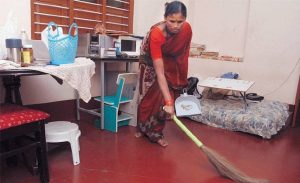 Another report says nine out of 10 Muslim workers in India earn their livelihood in the informal economy. The 2020 study by the Initiative for What Works to Advance Women and Girls in the Economy (IWWAGE) and the Institute of Social Studies Trust (ISST) found out that more Muslim women are engaged in the informal sector than women from any other religion in India.
Another report says nine out of 10 Muslim workers in India earn their livelihood in the informal economy. The 2020 study by the Initiative for What Works to Advance Women and Girls in the Economy (IWWAGE) and the Institute of Social Studies Trust (ISST) found out that more Muslim women are engaged in the informal sector than women from any other religion in India.
India’s domestic workers in general face rampant caste-based discrimination and even violence. Employers often restrict workers’ access to kitchens, washrooms, elevators, and even their places of worship. There are separate utensils for the workers to eat with but Muslim workers face further marginalization due to their religious identity, said Anita Kapoor, activist and general secretary at the Shehri Mahila Kamgar Union (Urban Domestic Workers’ Union) in New Delhi.
“Many workers have to hide their name and identity in order to get a job and avoid (further) discrimination,” she told media.
 “And it’s not only the worker who has to change her name but also her kids who often accompany their mothers to work, and their husbands who sometimes take up jobs like driving in the same households. So their entire family has to go through this struggle.”
“And it’s not only the worker who has to change her name but also her kids who often accompany their mothers to work, and their husbands who sometimes take up jobs like driving in the same households. So their entire family has to go through this struggle.”
Begum’s daughter Shahana Parveen, also a domestic worker, recalled an incident from her childhood when she accidentally used the traditional Arabic greeting “Assalam-o-alaikum” (peace be upon you) at her aunt’s workplace.
“My aunt immediately reprimanded me and said, ‘Shut up! Use Namaste!’ (A Hindu greeting). I think I got them in trouble that day,” the 35-year-old laughs.
Parveen is married to a Hindu and changed her name to Seema, a Hindu name. “I changed it when I married a Hindu man,” she clarifies.
“Personally, I never faced the problems my mother and aunts had. Even before my marriage, I never had to hide my identity. (Fortunately) I have worked for many good families, Hindus as well as Muslims.”
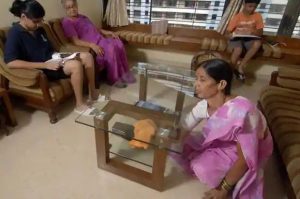 For Shabana Raeel though, the situation has not been this favourable. The 28-year-old recently had to quit work because of the discrimination she faced.
For Shabana Raeel though, the situation has not been this favourable. The 28-year-old recently had to quit work because of the discrimination she faced.
“Everywhere I go, they ask me about my identity. I know how to make food but they won’t give me the cooking job because I am a Muslim. Only recently, someone told me, ‘We don’t hire Muslims. They are untouchables to us. And the Brahmins (the highest caste in Hinduism), they don’t even let us enter their homes.”
Raeel is facing financial difficulties and has hardly been able to sustain work after the coronavirus pandemic.
“At one of the jobs, my employer was very good but her father-in-law used to fight with her over my hiring. He would tell me not to clean his room or cook for him. He would taunt me over my meat-eating habit. One day, I finally asked him, ‘Don’t Hindus eat meat?’”
A study earlier this year by Led By Foundation, that aims to raise the representation of India’s Muslim women in the workforce, says a Hindu woman in the informal sector is twice as likely to get a positive response than her equally qualified Muslim counterpart. The report titled ‘Hiring Bias: Employment for Muslim women at entry-level roles’ notes that there is a direct bias against Muslim women in the hiring process.
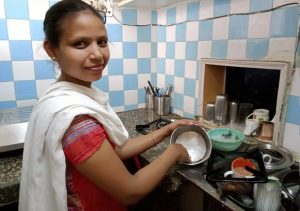 “Of all my clients, only one has hired a Muslim domestic worker,” Shashi Chaudhary, who runs a placement agency in New Delhi, told media.
“Of all my clients, only one has hired a Muslim domestic worker,” Shashi Chaudhary, who runs a placement agency in New Delhi, told media.
“So many Muslim girls and boys call me for work but what do I do? Nobody wants to hire them. I feel so helpless. Sometimes I feel like crying over their circumstances.”
Parijat Pande, a resident of New Delhi, says he avoids hiring Muslim workers because he does not want them around the family’s place of worship.
“It is about the sanctity of the place. Someone from another religion may not know the dos and don’ts that we follow. They also do not associate with [our] religious beliefs and faith.”
A young woman who requested anonymity said she was forced to hire workers from her own community due to parental pressure. “I don’t have any preference but my parents and relatives often have such views on working with people from a particular religion or community,” she told media.
 Tired of everyday humiliation, Raeel quit her job. “I just couldn’t do it. It felt so weird, so bad.” Her husband, who works as a driver, is the household’s sole earner now.
Tired of everyday humiliation, Raeel quit her job. “I just couldn’t do it. It felt so weird, so bad.” Her husband, who works as a driver, is the household’s sole earner now.
Activist Kapoor notes that many Muslim workers have, over the years, started giving Hindu names to their children so that they do not face similar challenges.
“Either they would give their kids a name that’s used in both the communities like Heena, or they would give two names to their children like Khushnuma and Khushi one for the official documents and the other for everyday use,” she told media.
Sometimes, she says, the employers themselves change a worker’s name. “Some of them give such ridiculous names to them it’s humiliating.”
 Pressmediaofindia
Pressmediaofindia
